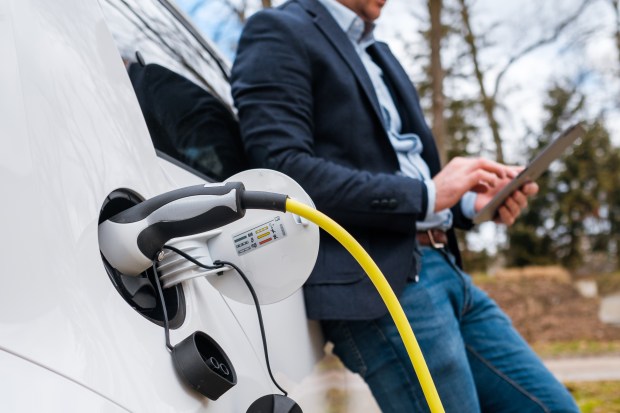AN electric car owner has voiced her frustration after she was charged with an additional $200 to renew her license plates.
Jessica Renee, who goes by jess.iereneexo on TikTok, questioned in a recent video whether her electric vehicle was worth it after she learned about the added on fees.
“So, at this point, I’m wondering does it make more sense to have a gas vehicle or an electric vehicle?” Renee asked her 1,500 followers on TikTok.
“Because I just got home and got my bill to renew my plates and it’s an extra $200 on here.”
Renee said the reason for the additional fees was because her car is a plug-in hybrid electric vehicle.
“The reason being, it says, plug-in hybrid electric vehicles will be assess an additional $100, $150, to $200,” she said in the clip, which has generated nearly 19,000 views.
Read more in The U.S. Sun
“Well, I guess mine is $200 because it’s an electric vehicle but what ‘fuel type fee,’ like what are y’all doing with my license plate to renew them each year?
“It ain’t like you’re a new one. It ain’t like you’re putting it on for me, or the tags on it. I’m physically doing that.
“So, what do y’all need $200 extra for? Please, somebody tell me why.”
Renee teased that she might get rid of her electric vehicle, captioning her video, “Between the electric bill and now this… throw the whole vehicle away.”
Fellow TikTokers flooded Renee’s comment section, informing her that despite being an EV owner, she still has to pay fuel fees because she uses roads and bridges.
“It’s for road use tax, EV, gas or diesel. Roads have to be constructed, maintained & repaired. Interstate highway construction can cost $8-$10M per mile,” one person said.
A second said, “Recoup gas tax to maintain the roadways.”
“Because you’re using the roads and bridges too. They collect this in the gas tax when someone buys gasoline and since you’re not using gasoline, they collect it this way,” another said.
Several states subject EV owners to additional registration fees to offset the loss of gasoline tax revenue that traditional gas cars generate.
Since electric vehicles use less gas, they contribute less to the state’s road maintenance funds, which are partially funded by gasoline tax.
Thirty-two states impose a special registration fee for EV owners, according to the National Conference of State Legislatures.
The additional fees EV owners pay ranges from state to state.
In Colorado, EV owners might pay as little as $50, while Texas residents will pay a $200 annual fee.
The states with the highest EV penalties, includes Utah at $368, Georgia at $325, Kentucky at $260, and Tennessee at $235.
Several states also charge annual battery electric vehicle fees or electricity taxes.
Electric vehicles vs gas

Pros and cons of EVs vs gasoline-powered vehicles
EV PROS:
- Convenient (when charging at home)
- Cheaper (depending on state or city)
- Cheaper maintenance, due to lack of mechanical parts
- Great for commuting
- Reduced CO2 emissions
- Federal and state tax incentives
- More performance (speed, handling – depending on the make and model)
EV CONS:
- Higher initial cost
- Higher insurance rates
- More frequent tire and brake replacement intervals
- Higher curb weight (thus causing more rapid wear on crucial parts)
- Low resale value
- High depreciation rates
- Lack of charging infrastructure
- Unreliable public charging (related: slow charging times)
- Poor winter and summer performance
- Lack of clean energy alternatives means more “dirty energy” from coal and nuclear sources
- Range anxiety
GAS PROS:
- Highly developed refueling infrastructure
- Fast refueling
- Cheaper insurance rates, depending on make, model, and configuration
- Established repair industry
- Lower initial cost
- Higher range before refueling, especially with hybrids
- Many manufacturers produce nearly emission-less engines
- Cheaper refueling, depending on the location
GAS CONS:
- Finite resource (related: heavy dependence on petroleum)
- Carbon emissions/greenhouse gases
- Higher repair costs
- Higher insurance rates, depending on make, model, and configuration
- Varying costs at the pump, depending on state, city, and county
Source: Car & Driver, Perch Energy, AutoWeek










